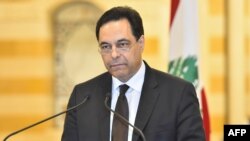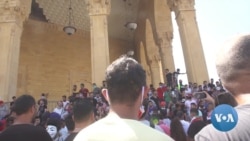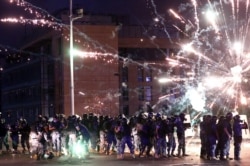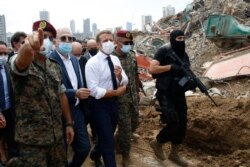Lebanon’s prime minister announced his government’s resignation Monday night in the aftermath of last week’s devastating explosion at the Port of Beirut and the public protests that followed.
“We want to open the door to national rescue, a rescue that the Lebanese will participate in achieving,” Prime Minister Hassan Diab said in a televised speech. “Therefore, today I announce the resignation of this government. May God protect Lebanon.”
Diab had formed his government in January after a protracted political crisis.
He laid the blame for the country’s myriad problems at the feet of the political elite, who have ruled Lebanon since the end of the civil war nearly 30 years ago. He said they have caused political and economic devastation and brought about last week’s tragedy and he called for accountability.
After addressing the nation, Diab went to the presidential palace where President Michel Aoun accepted the government’s resignation.
WATCH: Lebanon’s Government Quits in Face of Mounting Anger
Diab’s government will now be a caretaker until new elections are held. He did not say when that would be, but he had previously said he would draft legislation calling for early elections.
The decision comes after several ministers and lawmakers resigned, but calls continued for the entire government to go, including in mass demonstrations Saturday and Sunday.
Ahead of Diab’s announcement, protesters gathered in central Beirut near the parliament building. There were clashes with security forces and the Lebanese Red Cross reported transporting seven injured people to the hospital and treating nearly 40 others on the scene.
The massive blast, which killed at least 160 people, injured thousands and left more than 250,000 homeless, has been blamed on the detonation of 2,750 metric tonnes of ammonium nitrate that had been improperly stored for six years at the Port of Beirut.
In New York, U.N. Secretary-General Antonio Guterres said the voices of the Lebanese people must be heard.
“It is important that a credible and transparent investigation determine the cause of the explosion and bring about the accountability demanded by the Lebanese people,” Guterres told a humanitarian briefing on Lebanon.
His spokesperson said the U.N. stands ready to assist with an investigation, should the Lebanese authorities request it.
International solidarity with Lebanon has been strong and immediate.
On Sunday, at a donor’s conference co-hosted by French President Emmanuel Macron and the United Nations, world leaders pledged nearly $300 million to help the country – already reeling from political, economic and health crises – recover from the explosion.
Ahead of the conference, the United States made an initial pledge of $17 million in disaster aid, including food and medical supplies.
Rebuilding is expected to cost billions of dollars. Economists have forecast the damage could erase up to 25% of the country's economic output.
U.N. agencies are also on the ground assisting the population with food assistance, emergency shelter materials and search and rescue teams.
“The scale of the loss is so vast, it is likely every single person in Lebanon has been touched by this event,” said Najat Rochdi, the U.N. Resident and Humanitarian Coordinator for Lebanon.
Your browser does not support the iframe HTML tag. Try viewing this in a modern browser like Chrome, Safari, Firefox or Internet Explorer 9 or later.
(Move the slider at the center of the image above to see the Beirut port before and after the explosion.)
A top priority is getting a small part of the port operational in order to bring in food, medical supplies and construction materials.
“Working with the Lebanese army, we believe we can clear part of that site and have it operational in two to three weeks,” U.N. World Food Program Chief David Beasley said from Beirut.
Of particular concern is the country’s supply of grain and wheat, which was largely destroyed in silos housed at the port. The U.N. says the country has only about a month's supply left before there could be serious food shortages.
About 80% of Lebanon’s food is imported.










